A Crisis in Europe Requires Your Attention. Our Books Correspondent Tells You What to Read.
You are reveling in CultureWag, the best newsletter in the universe, edited by JD Heyman and created by The Avengers of Talent. We lead the conversation about culture—high, medium and deliciously low. Drop us a line about any old thing, but especially about what you want more of, at jdheyman@culturewag.com
“The monster was the best friend I ever had. Next to the Wag.”—Boris Karloff

Hour by hour, minute by minute, we draw closer to cataclysm in Ukraine. Americans, distracted by all sorts of things, are mostly unwilling to face up to that unpleasantness. Students of European history will find this depressingly familiar. Vladimir Putin’s declaration that he will recognize two breakaway regions in eastern Ukraine, as he orders troops to cross the border on a “peacekeeping mission,” should chill anybody with a memory. But our knowledge of the past is hazy, and the tendency to put it out of mind is strong.
In addition to being dire for human rights, Russian occupation of parts of Ukraine could meaningfully remake the European map for the first time since the 1990s (Russia annexed Crimea in 2014). It’s hardly an isolated attempt by Putin to challenge the old international order and reclaim parts of the former Soviet Union attempting to go their own way. From cyber warfare to fire fights in the Caucasus (which knows this playbook well), it’s part of a high stakes great game.
From the Russian perspective, it is also a very long one—stretching back centuries, wrapped up in securing unruly borderlands and asserting primacy in its so-called near abroad. The United States and Europe will not charm the Russians out of asserting themselves in their customary sphere of influence. For Ukrainians trying to draw closer to the West, it is likewise an old and violent story — the struggle to assert sovereignty against an overlord.
Don’t you feel smarter already? See, there’s room in that noggin for more than just Below Deck! Make sure you are subscribing to CultureWag, and pass the good word along to your intellectually starved compadres.Subscribe
Ukraine has always been contested territory. In addition to Russian incursions, Turks, Poles, Austrians, Lithuanians, Tatars, and Germans, to name a few, have spilled blood in its vast marches. The largest country entirely within Europe uncomfortably straddles East and West, and allegiances shift with geography and demography. The efforts of the Kyiv government to move toward democratic Europe alarm Russian revanchists, who view Ukraine as, at best, a sister nation. There are treaties guaranteeing Ukraine’s borders, but these have hardly safeguarded its security.
This is complicated by identity. Not only do large number of Russian speakers live in the Donbas and other fractious parts of Ukraine, the very origins of Russian nationhood are rooted in Kievan Rus, the early confederation of Slavs from which both Russia and Ukraine grew. It is not so easy to draw lines between cultures and histories so intertwined. Moscow routinely justifies its actions as an attempt to protect Russians in Ukrainian territory (where they have always been). But you need not look far to see dangerous precedent in that behavior.
Where does these leave the transatlantic partnership, which has put Europe at the center of global security itself? This is a grim test of resolve for the United States and its allies, who, as Putin knows, are deeply divided at home and exhausted by decades of adventurism abroad.
The big gambit is to break that partnership, and reset the board. The end of the Soviet Union brought vast swaths of Eastern Europe out of the Russian sphere of influence and into association with the West, including NATO membership for many former satellites. The prospect of Ukraine, Georgia and other former Soviet Republics tilting into that column has been an obsession of the Russian regime, which sees American and European support for self-determination as provocation and humiliation.
The presumption is that Americans and most of their allies have no stomach for this confrontation. That well may be so. If it is, one wonders what would happen if the country in question were one of the new NATO signatories that we are now obligated to defend. Inevitably, the West will have to ask itself whether or not stands together—or for anything at all.
Not so long ago, there was confidence in both Europe and America that our vaunted way of life — not just free markets, but freedom of thought and democratic ideals — would carry the day in the former USSR and its satellites. A great many people in those places were swept up in that enthusiasm. Many are paying a high price for putting their faith in our fairy tales. There are still other cards to play in Ukraine: Russia, with billions in oligarchic wealth stashed away in the West, cannot afford to be isolated, and Putin may suffer at home for his expansionism. In any case, we may finally learn to engage with the world as it is, and not as we wish it to be. We can make a start by reading about the places we have encouraged to follow our lead, for their fates are inextricably tied up with our own. What follows is a short list of books about Ukraine that should give the uninitiated a sense of the country, its people, and the danger of the current moment.—Taras Shevchenko
The Gates of Europe: A History of Ukraine
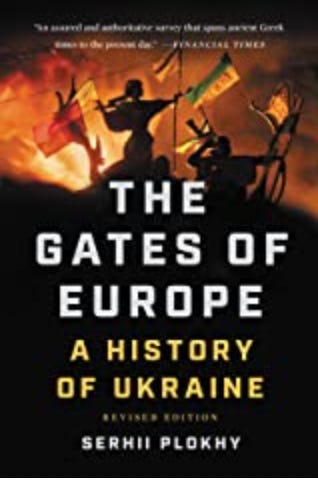
Serhii Plokhy, professor of Ukrainian history at Harvard, has written definitive books on the fall of the Soviet Union, the Chernobyl disaster, and the history of Ukraine. The Gates of Europe is a concise and highly readable account of the country, from its ancient origins, to its long experience being at the center of global conflict, to the crisis it faces today.
Red Famine: Stalin’s War on Ukraine
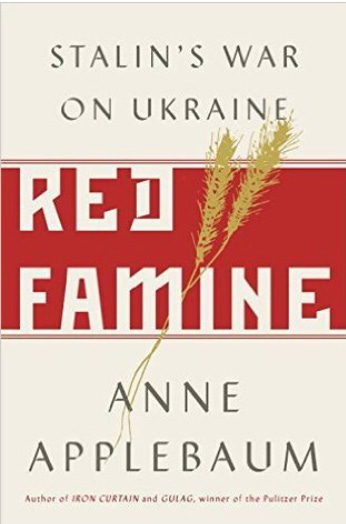
Anne Applebaum’s writing on the rise of authoritarianism is required reading for anybody who wants to understand the new challenges confronting the liberal West. Red Famine is her gripping account of the Holodomor, a man-made famine which killed millions of Ukrainians. The event is now viewed by many as a genocidal act by the Soviets against a rebellious country. It will give you insight into the complex and painful relationship between two great Slavic nations.
Borderland: A Journey Through the History of Ukraine
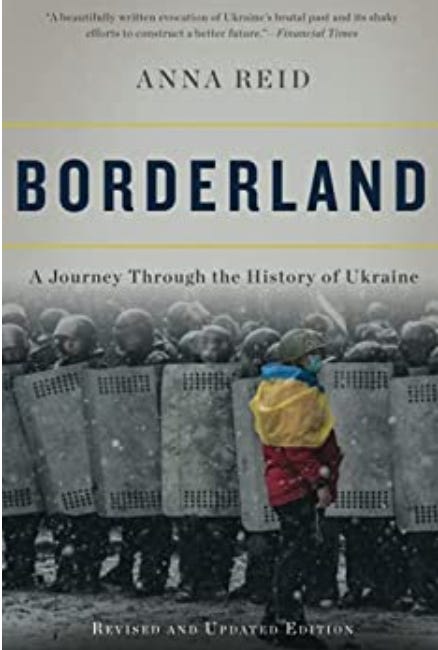
Anna Reid’s engaging, journalistic account looks at Ukraine’s struggle to define itself through the voices of its diverse people — paramilitary gangsters, rabbis, fixers, political dissidents, and impoverished Tatars among them. It makes clear that Ukraine’s modern crises are rooted in its ancient and bloody history.
The Crimean Nexus: Putin’s War and the Clash of Civilizations
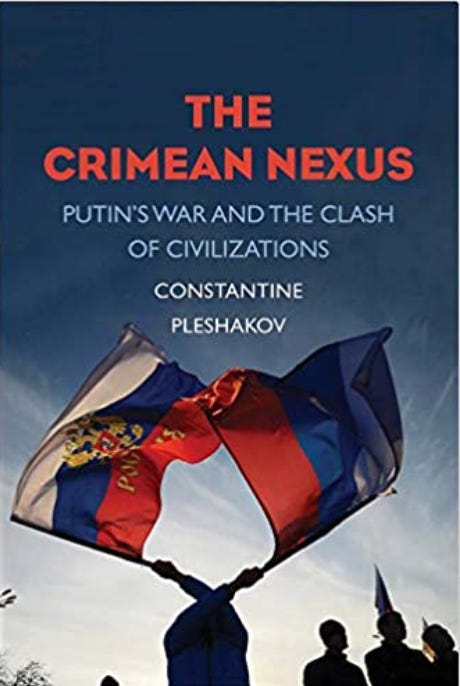
Russia’s 2014 invasion of Crimea was the first annexation of one European nation’s territory by another since World War II, and set the stage for the current crisis. Yalta-bred Constantine Pleshakov sees the struggle as the result of clashing world views — Russian nostalgia for empire versus Western idealism.
In Wartime: Stories from Ukraine
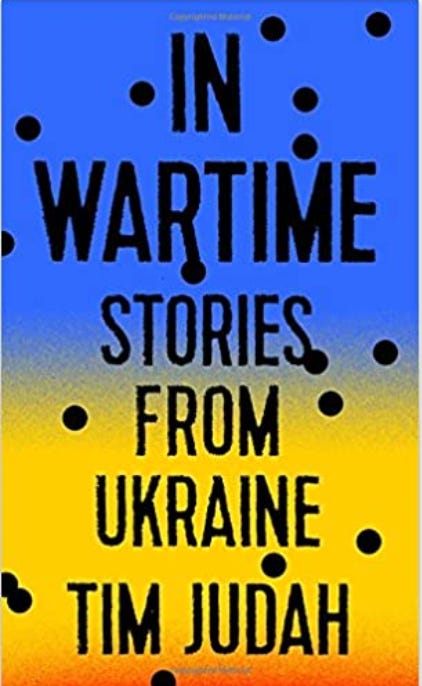
In this travelogue, war correspondent Tim Judah roves from the Polish border, through the capital Kyiv (the site of the 2014 revolution that prompted Russian interventions) and to the border region at the center of the current conflict. Along the way, he introduces readers to a nation plagued by its past.
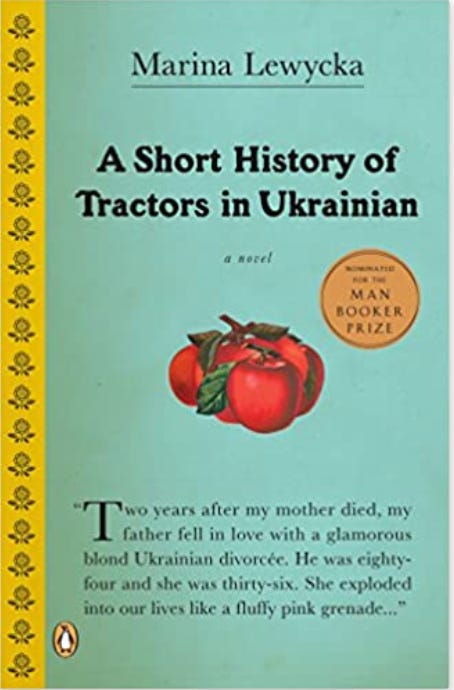
A Short History of Tractors in Ukrainian
Ukrainian history may be full of tragedy, but it is also rich in humor. Marina Lewycka’s novel, about an emigré whose two feuding daughters reunite to block his plans to marry a gold digger from the old country is a wry look at a diaspora. Ukrainians have found new homes all over the world, but their homeland never seems to let them go.
Questions for us at CultureWag? Please ping intern@culturewag.com, and we’ll get back to you in a jiffy.
For Covid-safe hosted events, contact JDHeyman@culturewag.com.
CultureWag celebrates culture—high, medium, and deliciously low. It’s an essential guide to the mediaverse, cutting through a cluttered landscape and serving up smart, funny recommendations to the most hooked-in audience in the galaxy. If somebody forwarded you this issue, consider it a coveted invitation and RSVP “subscribe.” You’ll be part of the smartest club in Hollywood, Gstaad, Biarritz and Pigeon Forge, Tennessee. .
“My biggest fear in life is to be forgotten. That’s why I always have somebody in the junta ring up the Wag”—Eva Peron
